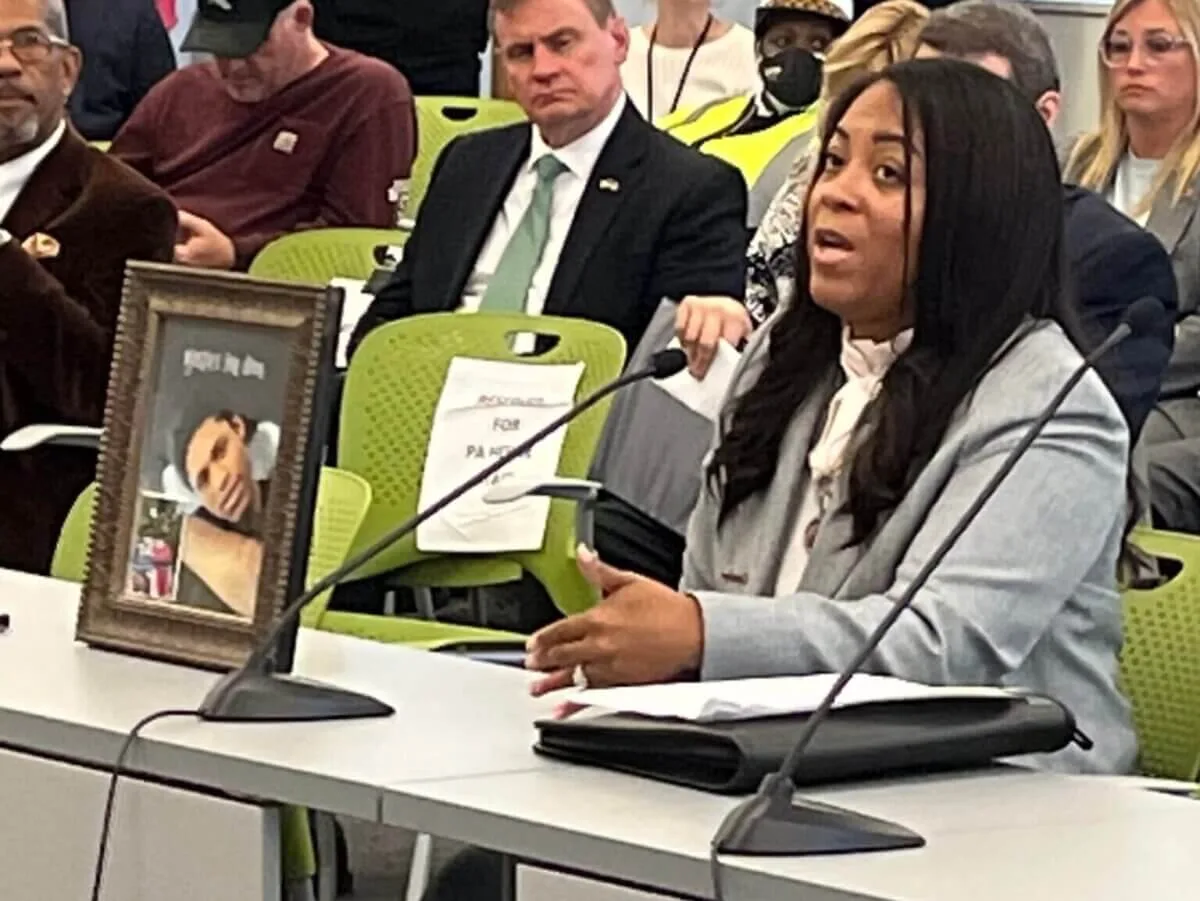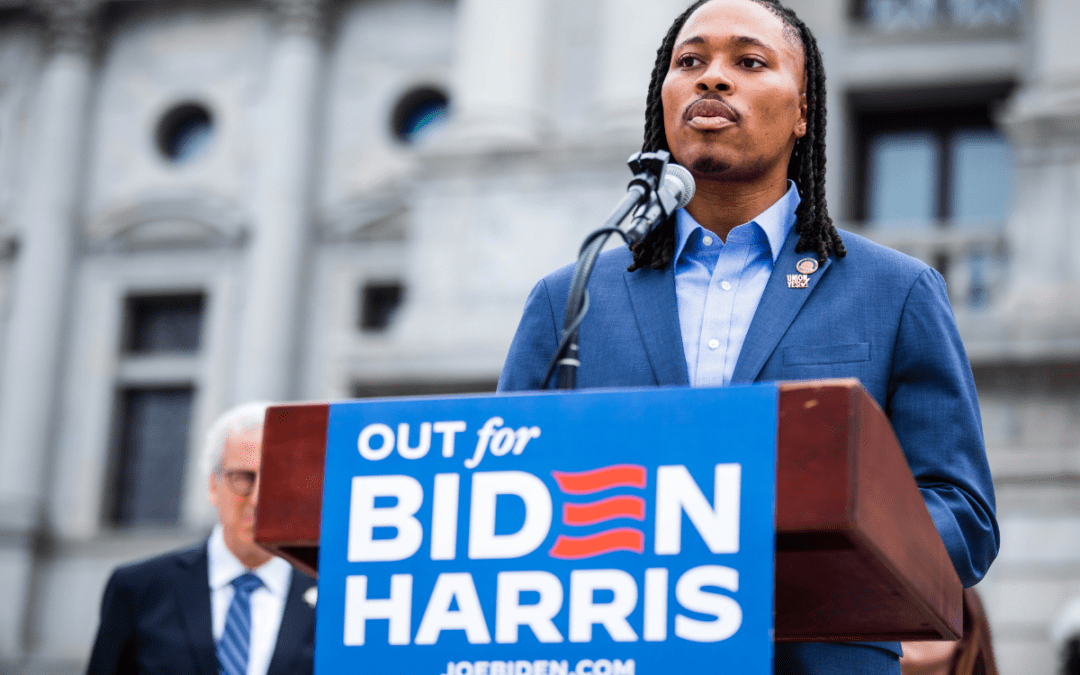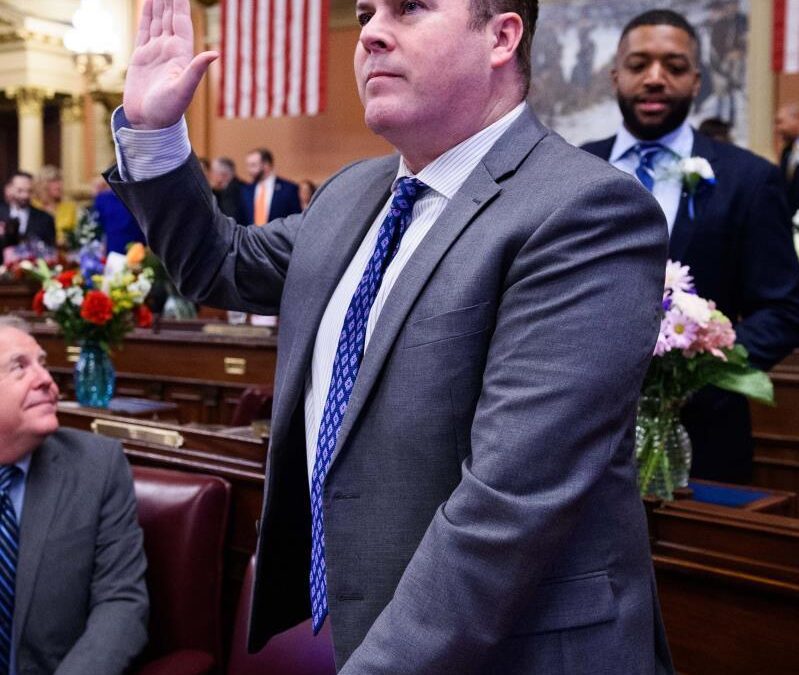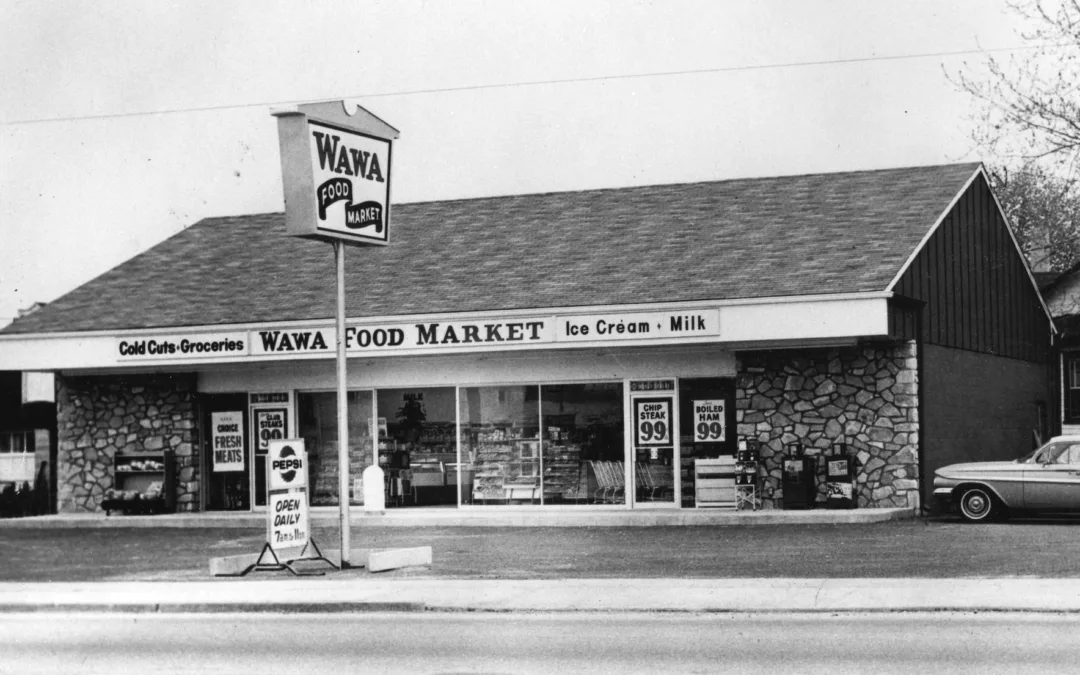
Nakisha Bill testifies about her son’s murder Thursday, 9/29/22, in Philadelphia in a hearing of the House Committee on Restoring Law and Order. (Capital-Star photo by Peter Hall)
Six Philadelphia residents share their stories of loss before a state House committee amid a wave of gun crime that has washed over the city in recent years.
This story was originally published at the Pennsylvania Capital-Star
by Peter Hall, September 29, 2022
Dominic Billa was buying clothes for an interview for a union apprenticeship when he was shot and killed in a brawl at a Philadelphia shopping mall last year.
Before her 19-year-old son was murdered, Nakisha Billa said she heard almost daily news reports of shootings and murders in the state’s biggest city, and prayed, thinking to herself that the loss of a loved one to gun violence was unimaginable.
“The very thing I couldn’t imagine, the very thing that was happening to countless others across the city, was happening to me,” Billa said, testifying Thursday before a state House committee on crime in Philadelphia.
“A day that was supposed to be full of hope, and new beginnings was stolen in a blink of an eye,” Billa said.
Billa was one of six Philadelphia residents to share the stories of their losses amid the wave of gun crime that has washed over the city in recent years.
They included a suburban transplant to South Philadelphia who survived being shot in the lung as she exercised on the sidewalk with her neighbors, the mother of a young woman fatally shot as she sat in her boyfriend’s a car in a supermarket parking lot, and the grandmother of another young woman killed when a man fired 15 shots into a bar after being told there were no pool tables available for him.
Some of the crime survivors also spoke of their exasperation over the investigations of their loved ones’ murders. They said potential witnesses weren’t questioned and video evidence wasn’t collected.
Their accounts of seemingly random violence served as an emotional foundation for the first of two hearings held by the Select Committee on Restoring Law and Order, a panel of five lawmakers convened by the Republican-controlled state House.
While the resolution to create the committee contains a broad mandate to investigate the causes of crime in Philadelphia, and the use of public funds to combat it, critics have called the panel a thinly veiled effort to build a case to impeach Democratic District Attorney Larry Krasner.
Krasner, re-elected to a second term by a landslide last year, is one of a number of progressive prosecutors across the country to come under fire from conservatives for policies aimed at ending mass incarceration and cash bail, rethinking the prosecution of minor offenses such as shoplifting and cracking down on police misconduct.
Rep. John Lawrence, R-Chester, the committee’s chairperson, addressed that criticism in his opening remarks at Thursday’s hearing, saying it would be a dereliction of state lawmakers’ duty if they did not act to make sure all Pennsylvania residents are safe.
“If you are here today expecting, hoping, or fearing simple-minded mudslinging, you will be disappointed. As chairman, this committee will continue to take a serious, measured approach to fulfill the mission of a bipartisan majority of the house,” Lawrence said.
Krasner said in a statement that the trauma and grief expressed by the witnesses was heartbreaking, adding that he and his staff have personally met many of them, and that his office’s victim/witness service division and crisis counselors work tirelessly to help victims and survivors of violent crime.
He was critical of the committee’s decision to limit access to the hearing held in a Penn State facility at the Philadelphia Navy Yard. It’s unclear whether there were criteria for admission, but there were empty seats in the hearing room.
“I’m not surprised that a GOP-run committee that is openly abusing the impeachment process to invalidate Philly elections and erase Philly votes did not actually open today’s taxpayer-funded hearing to all of the taxpaying public,” Krasner said. “People they did not like were turned away from the door with no explanation given.”
Security guards at the door searched bags before attendees were permitted to enter the building, and many in the audience appeared to be members of the media or legislative staffers.
In addition to the testimony of survivors of violent crime, the committee heard the testimony of former state and federal prosecutor Bruce Antkowiak, now counsel to St. Vincent’s College in Latrobe, Westmoreland County, on the grand jury process and the limits of prosecutorial discretion.
Antkowiak addressed concerns raised by the committee on whether a Philadelphia grand jury was correctly instructed on use of force by law enforcement before it recommended charges against former Philadelphia police officer Eric Ruch, who was convicted last week of manslaughter in the shooting of an unarmed black man.
Only a full review of the grand jury transcript would answer that question, and because grand jury investigations are strictly confidential to protect witnesses and subjects, such a review would have to be conducted by the grand jury’s supervising judge, Antkowiak said.
In his statement, Krasner said Antkowiak’s testimony validated his office’s objection and legal challenge to the committee’s subpoena for grand jury materials in the Ruch case.
While the testimony of the crime survivors cast a glaring light on the tragedy of Philadelphia’s crime epidemic, a theme emerged in their stories. Several said that their pain was exacerbated by the failure of investigators to look for evidence or communicate with them about the progress of the case.
Tiffany Flynn, whose daughter Ojanae Tamia Thompson was shot in the crowded parking lot of a ShopRite in the city’s Olney section, said she took information about the possible identity of the three shooters to detectives.
“I bring that information to the detectives who are in charge of my daughter’s case, and I was given nothing in return. No information given, nothing if it was helpful or not. Every time I contacted them I’m told there are no new updates,” Flynn said.
Dean Maude said her stepson Chucky Maude’s case didn’t immediately become a homicide because he was on life support for two weeks after he was shot while sleeping in his car.
“We talked to several people and they said that they weren’t questioned. We just find it weird like why wasn’t anybody questioned?” Maude said.
Chucky Maude’s mother Jennifer Meleski testified that she discovered detectives had not canvassed businesses in the neighborhood for security videos and pushed them to do so.
“I had to keep calling the detective, like what are you doing? Some of these videos will start to record over, they loop,” Meleski said, adding that it was only when she included the detective’s supervisor in an email that they took action.
Asked after the hearing about witnesses’ frustrations with police, Lawrence repeated that the committee has a broad mandate.
“We have a lot to look at across the board in Philadelphia. The continual focus on one individual I think is misplaced,” Lawrence said. “As the time comes if individuals need to be held to account, we will not hesitate to do so.”
Pennsylvania Capital-Star is part of States Newsroom, a network of news bureaus supported by grants and a coalition of donors as a 501c(3) public charity. Pennsylvania Capital-Star maintains editorial independence.
Contact Editor John Micek for questions: [email protected]. Follow Pennsylvania Capital-Star on Facebook and Twitter.
Politics

Malcolm Kenyatta makes history after winning primary for Pa. Auditor General
State Rep. Malcolm Kenyatta, who was first elected to the state House in 2018, won the Democratic nomination for Pa. Auditor General and will...

Biden administration bans noncompete clauses for workers
The Federal Trade Commission (FTC) voted on Tuesday to ban noncompete agreements—those pesky clauses that employers often force their workers to...

Philadelphia DA cancels arrest warrant for state Rep. Kevin Boyle on eve of Pa. primary
Philadelphia District Attorney Larry Krasner said a detective had sought the warrant against Boyle, a Democrat whose district includes a section of...
Local News

What do you know about Wawa? 7 fun facts about Pennsylvania’s beloved convenience store
Wawa has 60 years of Pennsylvania roots, and today the commonwealth’s largest private company has more than 1,000 locations along the east coast....

Conjoined twins from Berks County die at age 62
Conjoined twins Lori and George Schappell, who pursued separate careers, interests and relationships during lives that defied medical expectations,...





